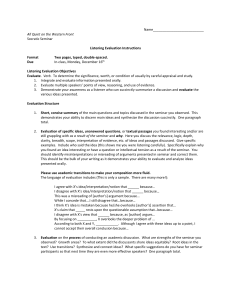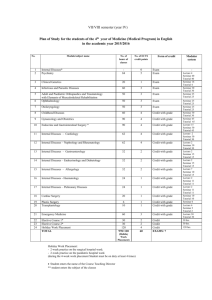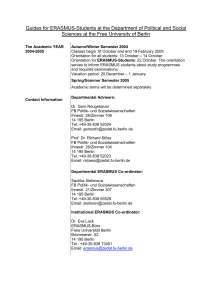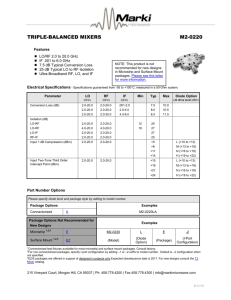Institutions of the European Union
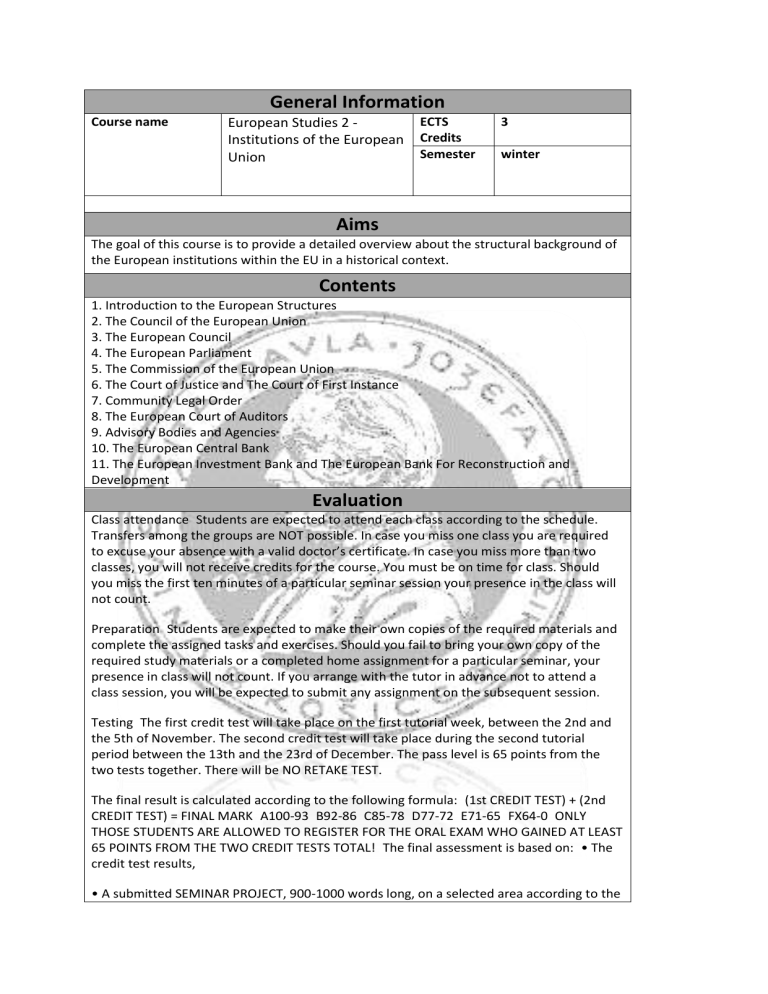
Course name
General Information
European Studies 2 -
Institutions of the European
Union
ECTS 3
Credits
Semester winter
Aims
The goal of this course is to provide a detailed overview about the structural background of the European institutions within the EU in a historical context.
Contents
1. Introduction to the European Structures
2. The Council of the European Union
3. The European Council
4. The European Parliament
5. The Commission of the European Union
6. The Court of Justice and The Court of First Instance
7. Community Legal Order
8. The European Court of Auditors
9. Advisory Bodies and Agencies
10. The European Central Bank
11. The European Investment Bank and The European Bank For Reconstruction and
Development
Evaluation
Class attendance Students are expected to attend each class according to the schedule.
Transfers among the groups are NOT possible. In case you miss one class you are required to excuse your absence with a valid doctor’s certificate. In case you miss more than two classes, you will not receive credits for the course. You must be on time for class. Should you miss the first ten minutes of a particular seminar session your presence in the class will not count.
Preparation Students are expected to make their own copies of the required materials and complete the assigned tasks and exercises. Should you fail to bring your own copy of the required study materials or a completed home assignment for a particular seminar, your presence in class will not count. If you arrange with the tutor in advance not to attend a class session, you will be expected to submit any assignment on the subsequent session.
Testing The first credit test will take place on the first tutorial week, between the 2nd and the 5th of November. The second credit test will take place during the second tutorial period between the 13th and the 23rd of December. The pass level is 65 points from the two tests together. There will be NO RETAKE TEST.
The final result is calculated according to the following formula: (1st CREDIT TEST) + (2nd
CREDIT TEST) = FINAL MARK A100-93 B92-86 C85-78 D77-72 E71-65 FX64-0 ONLY
THOSE STUDENTS ARE ALLOWED TO REGISTER FOR THE ORAL EXAM WHO GAINED AT LEAST
65 POINTS FROM THE TWO CREDIT TESTS TOTAL!
The final assessment is based on: • The credit test results,
• A submitted SEMINAR PROJECT, 900-1000 words long, on a selected area according to the
syllabus of the subject, • ORAL EXAM. On the oral exam the students are required, after a short period of preparation (3-5 minutes) independently discuss a randomly selected topic from the subject area (10-12 minutes), as well as perform a presentation (5-7 minutes) based on the topic of the submitted seminar project when READING IS STRICTLY
PROHIBITED!
Oral exam: • 0-20 points for correct data usage and presentation • 0-20 points for correct understanding of the political, economical, social, etc. connections in a wider historical context • 0-20 points for presentation skills, pronunciation, tone, Power Point presentation Seminar project: • 0-20 points for correct data usage and presentation • 0-
20 points for scientific presentation, style and precise formulation
The final mark is calculated according to the following scheme: Credit tests final result max.
100 points + (Oral exam max. 60 points + seminar project max. 40 points) = FINAL
MARK Example: 73 points (credit tests total) + (57 points oral exam + 20 points seminar project) = 150 points, D A:200–185 B:184–171 C:170–155 D:154–143 E:142–
129 FX:128–0
Bibliography
1. Archer, Clive: The European Union – Global Institutions, 2008, Routledge, ISBN: 978-0-
415-37011-6
2. Bomberg, Elizabeth, Peterson, John, Stubb Alexander: The European Union: How Does it
Work?, Oxford University Press, 2008, ISBN: 978-0-19-920639-1




